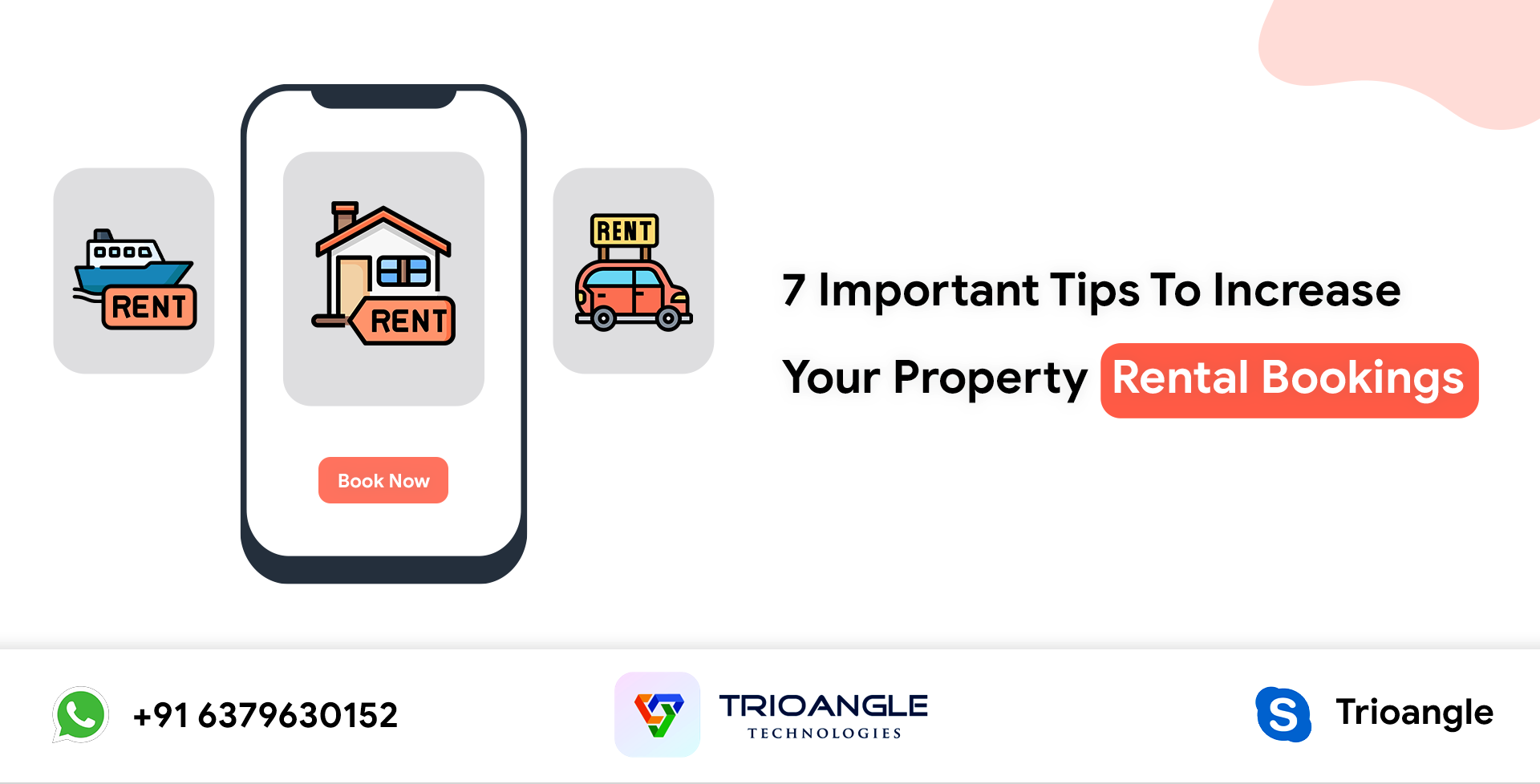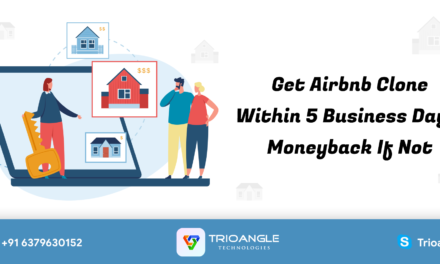Picture this! You are planning your dream vacation to Switzerland — the excitement of exploring new places, immersing yourself in different cultures and creating unforgettable memories.
But wait!
There is a critical aspect of travel that often goes unnoticed. Until the last minute: accommodation.
Today, travelers are turning to Airbnb like apps to find accommodations that suit their preferences and budget.
This trend led entrepreneurs and businesses to tap into this lucrative vacation rental market. Unfortunately, it is not so easy to develop a complete rental app from scratch. The task will be daunting. Time consuming. Etc. Etc…
Fortunately, there is a solution to it — the vacation rental script! It is a ready-made rental solution. A solid foundation. Upon which you can build your own rental app.
In this blog, we will explore the core of vacation rental scripts. Probe what is it? Its types. Why is it essential to develop your rental app? And how will it transform your business in the tourism and hospitality industry?
Are you ready? Great! Let’s go…
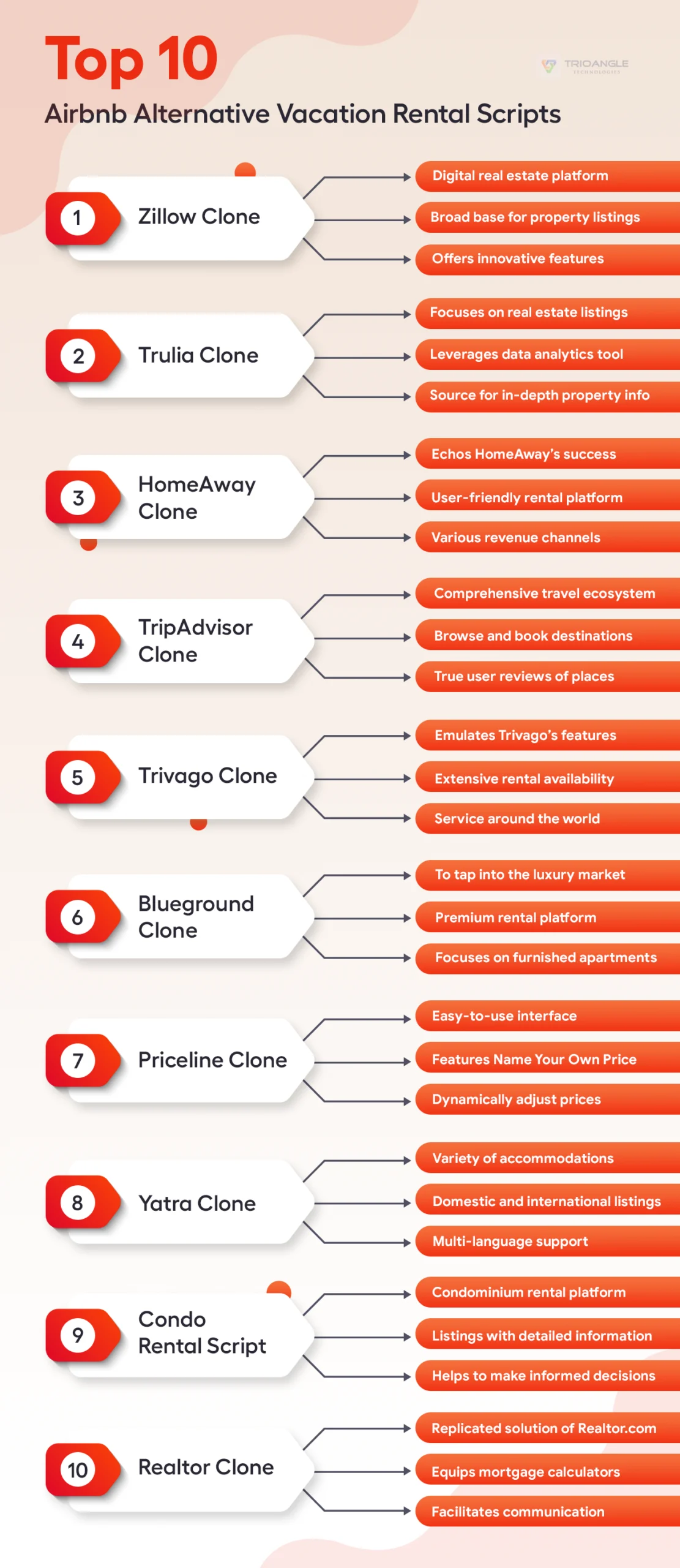
What is Vacation Rental Script?
Vacation rental script is the digital structure behind some of the most enchanting rental platforms in the world. It is a pre-built software solution packed with all the essential features and functionalities you need to kickstart your rental platform.
You may ask — “Why should I choose this script?” and “What sets it apart from traditional app development?”
The vacation rental script is all about speed. The efficiency. And the cost-effectiveness.
Instead of spending months (or even years) building your app from scratch, you can hit the ground running with a ready-made script.
This saves you time, resources, and headaches along the way.
There are different varieties of rental scripts available in the market. Let’s take a look at them…
Top 10 Vacation Rental Script Like Airbnb:
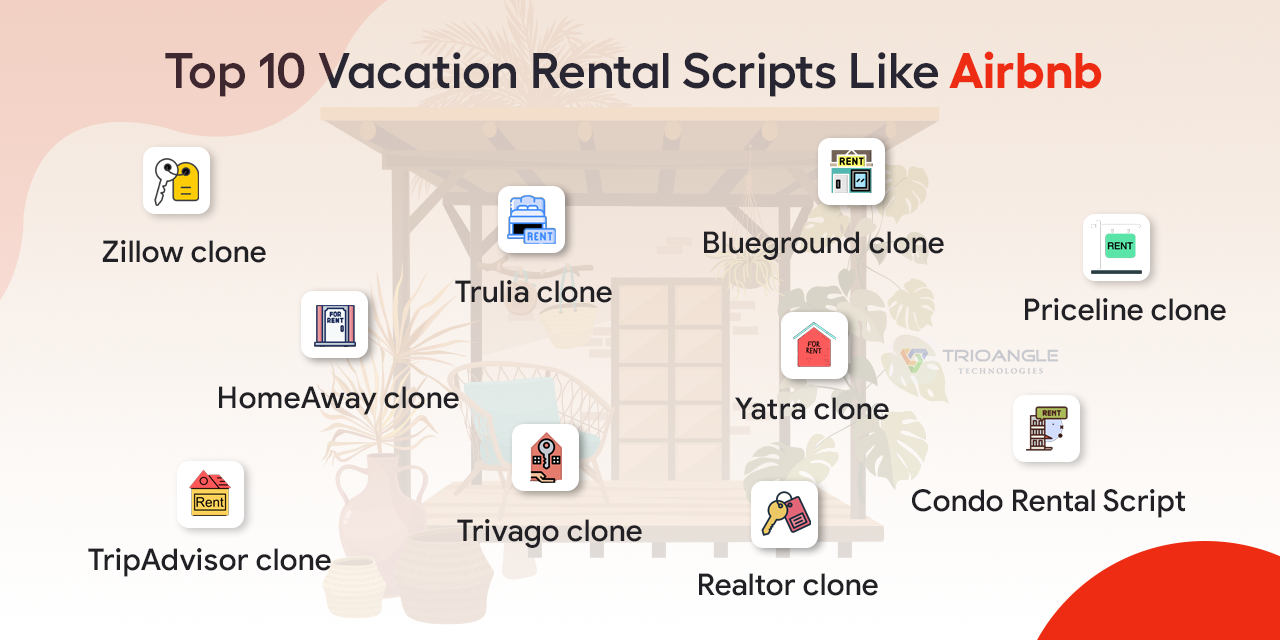
If you are planning to develop a vacation rental app like Airbnb, you can choose any rental solution listed below
1. Zillow Clone:
Zillow clone script is a digital real estate platform designed to replicate the functionality of Zillow. It provides users with access to a broad database of real estate listings. It includes homes for sale, apartments for rent, and other properties. The Zillow clone aims to provide a similar user experience and services to its audience.
Pros:
- Zillow clone leverages advanced technologies — machine learning, data analytics, and mapping services.
- It utilizes these technologies to offer users innovative tools and features for property search, valuation, comparison, and decision-making.
Cons:
- Zillow clones heavily rely on data from third-party sources such as MLS listings, public records, and user contributions.
- Any disruptions or limitations in accessing these data sources can impact the platform’s functionality and user experience.
Unique Selling Point:
Zillow clone offers immersive virtual tours of properties. Users can view the property in 360 degrees. They can explore homes as if they were there in person.
2. Trulia Clone:
Trulia clone script aims to clone the popular online real estate marketplace, Trulia, headquartered in San Fransisco, CA. Its major focus is on real estate listings and property searches. Trulia Clone helps users search for homes, apartments, and other real estate properties for rent. They can use this platform to sell their properties also.
Pros:
- Trulia clone can leverage data analytics and market insights.
- It can provide users with valuable information related to real estate prices, market demand, neighborhood demographics, school ratings, crime statistics, and other factors influencing property decisions.
Cons:
- The online real estate market is highly competitive in 2024.
- There are several established players like Realtor.com and Redfin dominating the industry. Your Trulia clone will take some time before breaking into this space and gaining market share.
Unique Selling Point:
Trulia clone comes with features such as customizable search filters, interactive maps, saved searches, and personalized recommendations which empower users to find their ideal homes and investments efficiently.
3. HomeAway clone:
HomeAway clone script is designed to reproduce the success of HomeAway, a popular vacation rental marketplace. It is built with similar features and functionalities to HomeAway. This Airbnb-like app offers a user-friendly platform for property owners and travelers.
Pros:
- HomeAway clone enables you to generate revenue through various channels.
- Channels include booking commissions, subscription fees from property owners, featured listings, and advertising.
Cons:
- The platform may encounter issues such as misleading descriptions, inaccurate photos, or disputes between property owners and travelers.
Unique Selling Point:
The unique selling point of a HomeAway clone lies in its ability to offer travelers a diverse selection of unique holiday homes, rooms, and other short-term accommodations for rent worldwide.
4. TripAdvisor Clone:
TripAdvisor clone enables entrepreneurs to create a vacation rental platform inspired by TripAdvisor’s comprehensive travel ecosystem. It allows users to browse and discover various destinations, accommodations, restaurants, activities, and attractions based on reviews and ratings provided by other users.
Pros:
- There is a significant demand for TripAdvisor clone apps that help travelers plan their trips efficiently.
- It provides comprehensive information and user-generated reviews about tourist destinations.
Cons:
- TripAdvisor clone is a feature-rich platform.
- Building and maintaining such a platform requires vital technical infrastructure, expertise, and ongoing maintenance.
Unique Selling Point:
TripAdvisor clone is a platform for travelers to explore and book their trips with confidence. The platform provides valuable insights on tourism that help travelers make informed decisions and create memorable travel experiences.
5. Trivago Clone:
Trivago clone is a website/application that emulates the functionality and features of the famous online hotel booking platform — Trivago. This rental platform is known for its user-friendly interface and extensive availability of hotels and accommodations worldwide. Trivago clone is the replication of these elements.
Pros:
- Leveraging the Trivago brand concept can help you to attract more users.
- With the Trivago clone, you can successfully launch your service around the world. It is designed to scale effectively.
Cons:
- Developing and maintaining an app like Trivago requires significant resources.
- Resources include time, money, and skilled personnel for software development.
Unique Selling Point:
It has been implemented with personalized recommendation engines. It can provide value-added services such as travel insurance, airport transfers, local experiences, etc.
6. Blueground clone:
Blueground clone is a turnkey solution for entrepreneurs to build a premium rental platform. It is a replication of the Blueground app, a prop-tech company, that offers exquisite and fully equipped apartments for rent. With the Blueground clone, you can develop a platform that offers your customers highly furnished apartments which has facilities like high-speed Wi-Fi connection, smart workspace, enhanced home entertainment, etc.
Pros:
- You can tap into the market of luxury accommodation.
- Blueground clone specializes in offering a high-end experience for discerning travelers seeking upscale housing.
Cons:
- While the Blueground clone script offers unparalleled luxury, accommodation availability may be limited in certain markets.
- Restricting access for travelers who need luxurious experiences in those regions.
Unique Selling Point:
Blueground clone caters to the luxury travel market with meticulously curated properties and personalized concierge services.
7. Priceline Clone:
Priceline clone script provides users with an easy-to-use interface for discovering and booking house rentals, hotels, flights, and other travel accommodations. Drawing inspiration from Priceline’s innovative approach to online booking, the script incorporates features such as the “Name Your Own Price” tool, which allows travelers to bid on accommodations and secure exclusive deals.
Pros:
- One of the key components of the Priceline clone is its DYNAMIC PRICING SYSTEM.
- It enables the clone to dynamically adjust prices based on the factors — demand, availability, and user preferences.
Cons:
- Building dynamic pricing algorithms similar to Priceline can be complex.
- It may require sophisticated algorithms and technologies.
Unique Selling Point:
Its USP is empowering travelers to negotiate prices and find unimaginable deals on travel accommodations.
8. Yatra Clone:
Yatra clone offers a variety of accommodation options for its users. It enables users to book travel services such as flights, hotels, holiday packages, car rentals, and many more. The clone possesses multi-language support, domestic and international listings, and multiple payment options.
Pros:
- Yatra is a prominent Indian travel company. Yatra clone is the replica of Yatra that has localization capabilities that cater to the unique requirements of Indian travelers.
- The clone includes features such as localized content, virtual payment options, and customer support in regional languages and currencies.
Cons:
- Developing a clone app raises the risk of imitation and potential legal issues related to intellectual property rights and trademark infringement.
- So, you must ensure your Yatra clone’s design, branding, and features are sufficiently different from Yatra’s to avoid legal disputes.
Unique Selling Point:
With Yatra clone, you can target the rapidly growing Indian travel market with localized content, and personalized customer support.
9. Condo Rental Script:
Condo rental script is an online condominium rental website solution that enables you to get started with your own rental platform. This script allows property owners to list condominiums with detailed information about the amenities such as swimming pools, fitness centers, parking facilities, and security features. This helps customers make informed decisions.
Pros:
- Condo rental script allows you to target a specific niche within the rental industry.
- The script typically includes features tailored to the special needs of condo owners and renters, such as amenities listings, HOA management tools, and community forums.
Cons:
- Condominium rentals typically command higher price points compared to other types of accommodations.
- It may discourage budget-conscious customers from renting such amenity-rich properties.
Unique Selling Point:
Unlike generic property rental scripts that offer a broad range of accommodations, condo rental script focuses exclusively on condominium properties. It is a specialized platform dedicated to this niche market segment.
10. Realtor Clone:
Realtor clone is a replicated solution of Realtor.com. It is a real estate marketplace solution where sellers will list their properties for sale. The buyers will view and purchase the listed properties by negotiating with the seller. It is an excellent solution for entrepreneurs who desire to launch their own real estate marketplace platform.
Pros:
- To assist users in making decisions, the Realtor clone is equipped with mortgage calculators.
- Users can use this calculator to estimate monthly mortgage payments based on factors such as loan amount, interest rate, and term.
Cons:
- We already know the real estate market is highly competitive. Realtor.com itself dominates this industry.
- So contesting with this competitor is quite challenging. You have to overcome it by making significant marketing efforts and differentiation strategies.
Unique Selling Point:
Realtor clone is a customizable and scalable platform. You can tailor this solution to your precise business needs and objectives. Whether launching a niche real estate marketplace or scaling up to serve a wide market — the script can accommodate to your evolving requirements.
Each of these vacation rental scripts comes with its own set of advantages and limitations. By carefully evaluating your business needs and target audience, you can choose the script that best sympathizes with your goals and aspirations.
Practical Tips for Customizing Your Vacation Rental App:
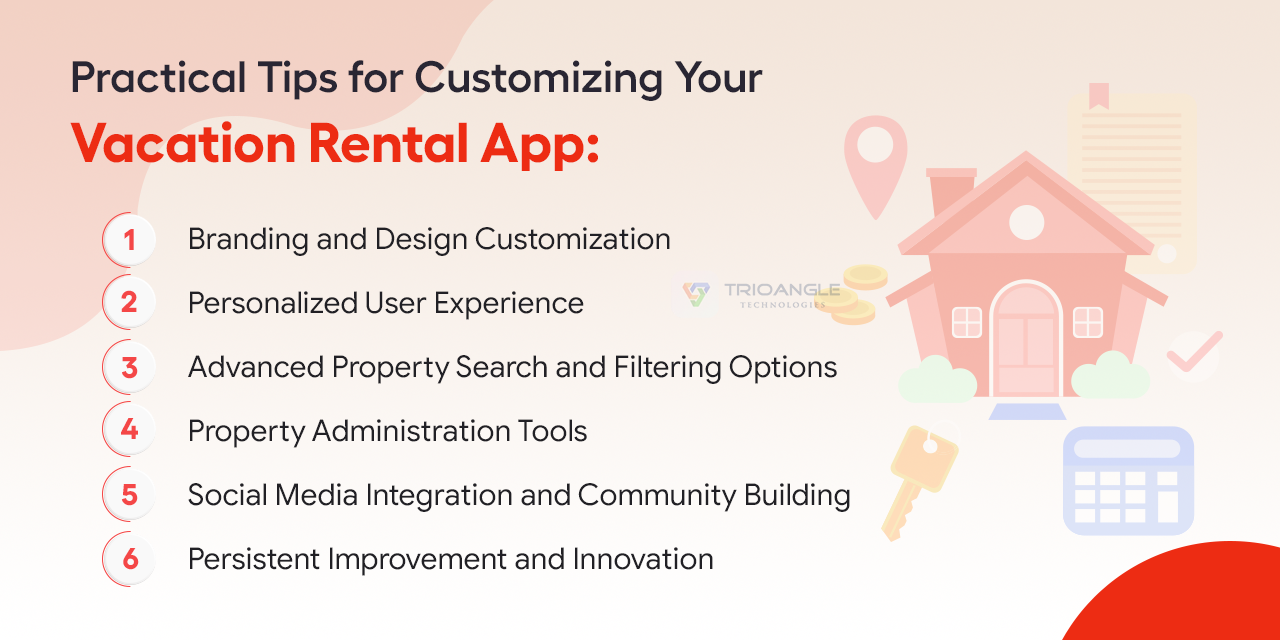
Customizing your room/hotel/real estate/vacation rental app is crucial to making it stand out in the competitive market. Here are some practical tips for you to customize and optimize your rental app using the chosen script:
1. Branding and Design Customization:
- Customize the design elements of your app to mirror your brand identity. Design elements include colors, fonts, and logos.
- Ensure consistency in branding across all pages and touchpoints. Consistency enhances brand recognition.
- Use top-tier images and visual elements to showcase properties elegantly.
2. Personalized User Experience:
- Enforce user profiles and preferences to personalize the browsing experience for each user.
- Provide personalized recommendations based on past searches, booking history, and user behavior. This will boost engagement and conversion rates.
- Enable users to save favorite properties, create wishlists, and receive updates for relevant listings or special offers.
3. Advanced Property Search and Filtering Options:
- Improve the search functionality of your app by integrating advanced filtering options such as price range, location, property type, amenities, and availability dates.
- Construct smart search algorithms to provide accurate and relevant results based on user queries.
- Allow users to save search criteria and set up alerts for new listings matching their desires.
4. Property Administration Tools:
- Provide property owners with intuitive tools for listing management. They should have the option to manage property details, availability calendar, pricing, and bookings.
- Think about offering an automated messaging feature to smoothen interactions between property owners and guests.
- Integrate analytics and reporting tools to track performance metrics, monitor bookings, and pinpoint areas that need improvements.
5. Social Media Integration and Community Building:
- Enable social login options (Facebook, Google, X, Apple ID) to simplify the registration process for your users.
- Integrating the social media sharing feature enables users to share their bookings on their social media profiles. It is also a strategy to encourage user engagement.
- Grow a sense of community by incorporating socializing attributes — user reviews, ratings, and comments.
6. Persistent Improvement and Innovation:
- Regularly gather user feedback via surveys, ratings, and reviews to identify their pain points and priorities.
- Keep yourself updated with industry trends, and tech advancements to utilize new features to stay ahead of the competition.
- Iterate and refine your app based on data-driven insights and user feedback to ensure ongoing relevance and satisfaction.
By following these tips for customizing and optimizing your rental app, you can distinguish your services, improve customer satisfaction, and maximize your app’s success.
Step By Step Guide For Launching Your Vacation Rental Script:
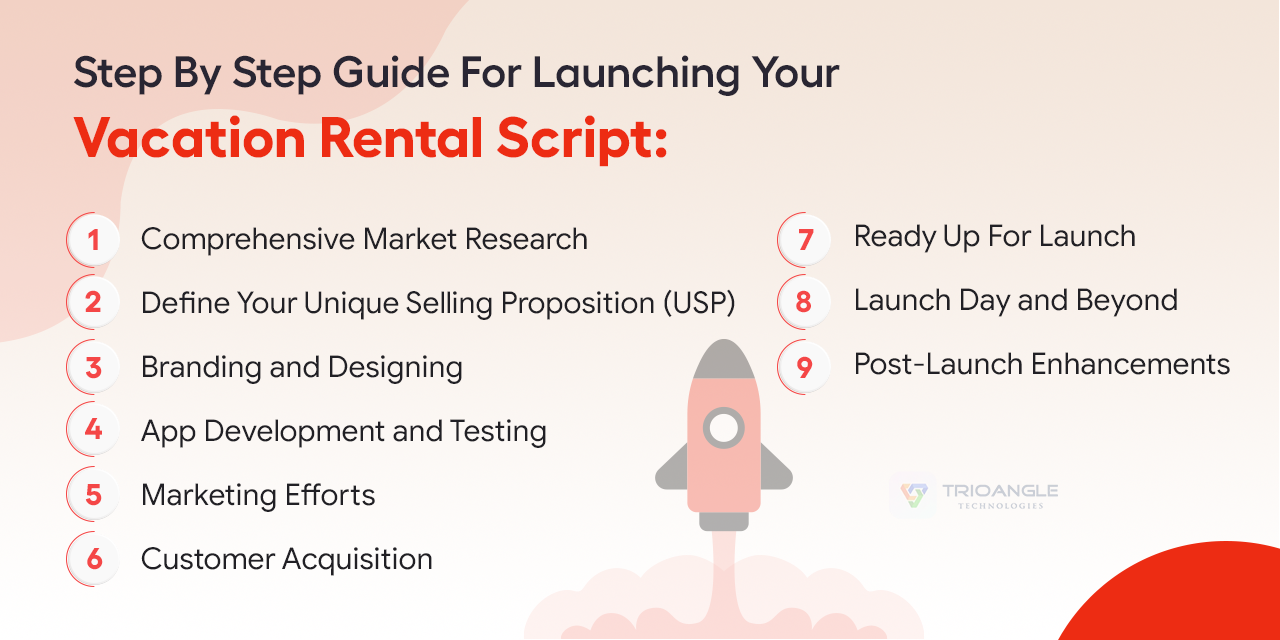
Launching your vacation rental script needs careful planning and implementation for a successful introduction to the market. Here is a step-by-step guide outlining the best practices for establishing your vacation rental app:
1. Comprehensive Market Research:
Conduct market research meticulously. Understand the landscape, target audience, demographics, and industry trends.
Identify your key competitors. Analyze their strengths and weaknesses.
Find out the opportunities to differentiate your offerings. Gather insights into user preferences, pain points, and behavior to inform your app’s features, design, and marketing strategies.
2. Define Your Unique Selling Proposition (USP):
Clearly define your app’s unique value proposition. Differentiate it from competitors in the market.
Highlight what sets your rental app apart. Whether it’s unique features, niche targeting, superior customer service, or exclusive partnerships.
3. Branding and Designing:
Produce a compelling brand identity. The identity should resonate with your customers and reflect your app’s value proposition.
Create a visually appealing app design. Ensure it enhances usability, reinforces trust, and aligns with your brand image.
4. App Development and Testing:
Partner with a reliable app development company. Utilize the chosen vacation rental script to build your app.
Conduct thorough testing to identify and resolve any bugs, glitches, or usability issues. Make sure the app is functioning well before the official launch.
Also, ensure its compatibility across various devices and operating systems to provide a seamless user experience for all users.
5. Marketing Efforts:
Design a complete marketing strategy encompassing both pre-launch and post-launch activities.
Utilize a mix of online marketing channels:
- Social media marketing
- Search engine optimization (SEO)
- Email marketing
- Content marketing
- Influence partnerships
Create engaging promotional materials, such as teaser videos, blog posts, press releases, and social media campaigns, to generate buzz and anticipation for your app.
6. Customer Acquisition:
Onboarding customers to your rental app is crucial. Therefore, identify your target audience segments and prepare your marketing efforts to reach and engage them effectively.
Offer incentives such as early bird discounts, referral bonuses, or exclusive deals, to encourage early adoption and customer loyalty.
You can partner with travel agencies, property owners, influencers, and other relevant stakeholders to augment your reach further.
7. Ready Up For Launch:
Mark a launch date. Create a detailed launch plan including all tasks, responsibilities, and timelines.
Ensure all app elements are fully operational and ready to meet the customer.
8. Launch Day and Beyond:
It’s the moment to execute your launch plan meticulously.
Monitor the app’s performance. If any issues arise after the launch, address them promptly.
Continuously gather feedback from users. Update your app and its features regularly.
9. Post-Launch Enhancements:
The job continues even after the app launch. Always monitor user feedback, reviews, and app analytics. You will find room for improvement.
Implement new updates. Fix bugs. Enhance existing features and designs. Your app enhancement activities should be based on users’ needs and market trends.
Maintain ongoing marketing efforts to sustain user engagement, attract new users, and drive app growth in the long term.
You can effectively introduce your app to the market by following these given best practices. Give more focus to app development activities. Continuously maintain your app’s quality and keep it to the trend.
5 Must Know Future Trends in The Vacation Rental Industry:
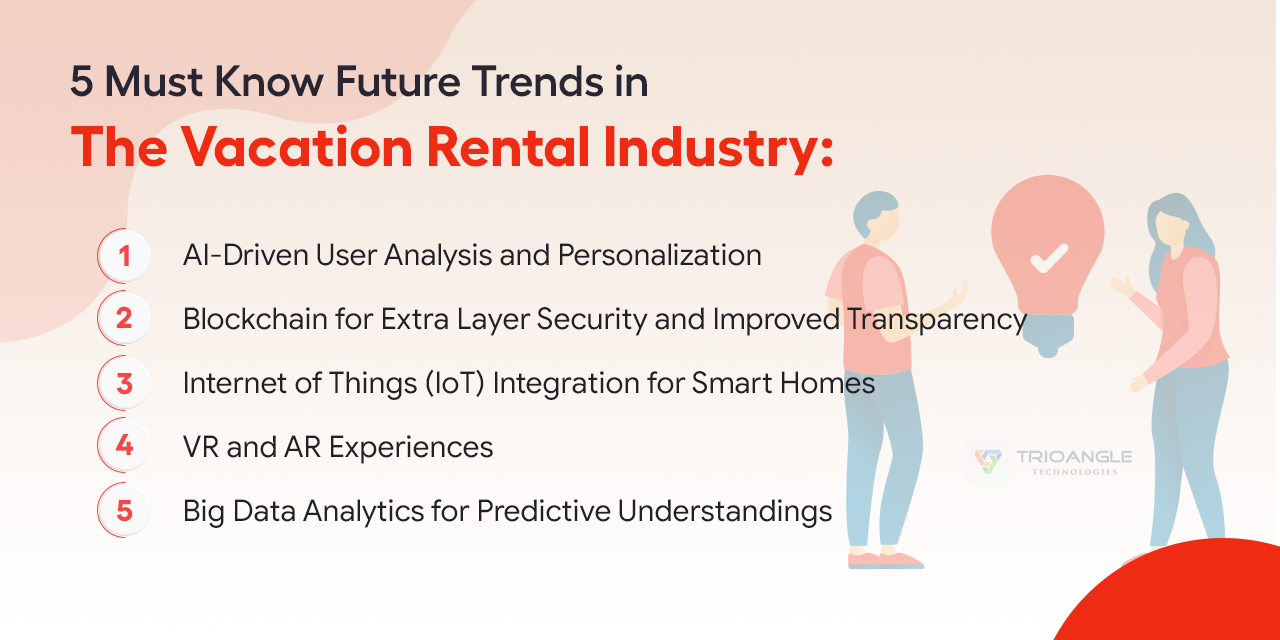
As technology continues to evolve, vacation rental scrips are also adapting to meet the changing needs of travelers and property owners. There are some emerging trends and technologies of this script you must know about. They are here for you:
1. AI-Driven User Analysis and Personalization:
Artificial Intelligence (AI) is remodeling the world. It is playing its part in the vacation rental industry also. AI algorithms can analyze user behavior, preferences, and past interactions to deliver tailor-made recommendations, pricing suggestions, and target promotions.
2. Blockchain for Extra Layer Security and Improved Transparency:
Blockchain technology holds promise for offering enhanced security and transparency. It can facilitate secured data sharing and tamper-proof transactions with decentralized ledgers. Smart contracts powered by blockchain can automate rental agreements and payment processing.
3. Internet of Things (IoT) Integration for Smart Homes:
The Internet of Things is transforming vacation rentals into smart homes. Equipped with interconnected devices and sensors. IoT devices such as smart locks, thermostats, security cameras, and energy monitors can enrich comfort, safety, and efficiency for both guests and property owners.
4. VR and AR Experiences:
Virtual Reality (VR) and Augmented Reality (AR) technologies are altering how travelers search, explore, and book accommodations. VR simulations enable guests to virtually tour properties and visualize themselves in the space before making a reservation. AR applications can provide real-time information about nearby attractions, points of interest, and amenities.
5. Big Data Analytics for Predictive Understandings:
Big Data analytics harnesses vast amounts of data generated by users, properties, and market trends. With this predictive analytics algorithm, rental scripts can identify market patterns, forecast demand, and optimize pricing strategies to maximize occupancy rates and profits.
These innovative solutions can carry the guest and host experience to the next level. By embracing these future trends and technologies, your vacation rental script can stay ahead of the curve.
Choose the Premier Vacation Rental Script to Move Your Business Forward!
We are at the bottom of this article… To conclude, the world of vacation rental scripts offers you numerous options.
From the top 10 rental solutions we saw, each script equips unique features and capabilities to propel your business forward.
Whether you are a budding entrepreneur or an established rental provider, choosing the right vacation rental script is crucial for success!
Adopt innovation, stay ahead, and dare to dream big!!! — Your vacation rental success begins here onwards.
GOOD LUCK TO YOU!



